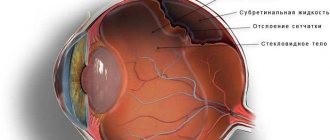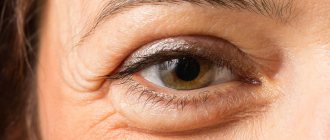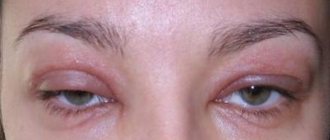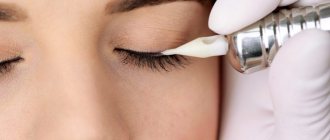What can cause facial swelling?
An allergic reaction can cause angioedema of the face. The reasons that provoke such swelling are all kinds of allergens that come into contact with a person (foods, medications, insect poison and others). Allergic swelling of the face, as a rule, is accompanied by additional symptoms, in particular, the following may appear:
- rash and itching;
- difficulty breathing;
- in severe cases - loss of consciousness.
If the swelling is accompanied by cyanosis, then it is likely that the cause of the pathology is vascular in nature. In this case, the likely cause of facial swelling is thrombosis of the superior vena cava.
Infections localized in carious teeth, paranasal sinuses and tonsils can lead to worsened outflow and stagnation of lymph in the lymph nodes of the lower jaw. This leads to unilateral or bilateral swelling of the face, which disappears along with the subsidence of the inflammatory process.
Less common causes of facial swelling are scleroderma, dermatomyositis, and cavernous sinus thrombosis, which is usually observed after inflammation of the paranasal sinuses or other parts of the face. This disease is typical for people with diabetes and reduced immunity.
Disturbances in the functioning of the body
If your face is swollen, first of all you should deal with the sources of the problem, since there can be a lot of reasons. The most dangerous situation is the accumulation of fluid as a symptom of the disease, and in each case the clinical picture will have its own characteristics. A cosmetic defect on the face is formed under the influence of the following disorders:
- diseases of the heart and blood vessels. Disturbances in the functioning of the heart muscle lead to the fact that the face becomes not just swollen, but also flabby, the skin is dense and does not move when touched. The problem typically develops in the late afternoon, along with increasing heaviness and shortness of breath. A swollen and cyanotic face often indicates vascular diseases;
- impaired kidney function - the main swelling forms under the eyes. Mostly the problem manifests itself in the morning, the face first becomes proportionately enlarged, and then the eyelids begin to swell greatly. Features of fluid accumulation due to renal disorders are a yellowish tint of the skin, wateriness of the formed edemas and their mobility. Chronic diseases are often accompanied by noticeable weight gain due to edema localized inside the body;
- thrombosis of the superior vena cava - problems are caused by difficulties with blood flow in the upper part of the body, and a swollen face often acquires an unpleasant bluish tint;
- Allergy is one of the possible causes of fluid retention. An allergic reaction to household chemicals, food, insect bites, and medications often causes swelling of the face, which is additionally accompanied by itching, rash, the skin becomes red, and sometimes becomes covered with spots. There may be episodes of difficulty breathing (Quincke's edema);
- an inflammatory process localized in the nasal cavity (in particular sinusitis), tonsils - the difficulty of fluid outflow in the lymph nodes in the jaw area leads to the development of either unilateral (on the right or left side of the face) or bilateral edema;
- endocrine diseases. With insufficiency of thyroid hormones, severe skin swelling of the face appears with accumulation of mucous tissue;
- sunburn – swelling is located in the area of the eyes, nose and forehead;
- Osteochondrosis of the cervical spine - patients often have swollen eyelids and cheeks. Characteristic is impaired hearing and visual acuity and an unpleasant feeling that the head is filled with fluid;
- malignant and benign neoplasms in the face and neck;
- traumatic injury - bruise, fracture, other problems after a blow to the face. This is a normal reaction of the body to damage to tissues and blood vessels;
- specific reaction to blood transfusion;
- pregnancy. Swelling occurs both for natural reasons - for example, the mucous membranes in the nose and labia swell due to increased production of progesterone, and under pathological conditions - swelling of the face and hands is a symptom of the most difficult stage of gestosis (late toxicosis).
Swelling of the face in a child occurs for the same reasons as in an adult, but there are also specific factors:
- the period of teething - accompanied by swelling of the mucous membranes, cheeks, lips. Additional symptoms – excessive drooling, runny nose, fever;
- liver diseases are expressed by swelling of the face;
- peculiarities of the baby’s body after birth - incorrect body position during sleep leads to morning swelling of the face.
Symptoms
Looking at a person who has swelling of the body, it is clear that parts of the body are swollen, as if increased in size. The skin ceases to be elastic; if you press the skin with your finger and release it, a depression (pit) will remain on it.
The location of the swelling will depend on the disease. In cardiovascular patients, edema is located on the legs (lower leg, ankle). If this is a bedridden patient, then the swelling covers the lower back and sacrum. Sometimes, such diseases lead to the development of ascites, i.e. there will be swelling of the anterior abdominal wall.
Kidney diseases leave swelling first on the face, then on the ankle, lower leg, knee, abdominal cavity, genitals, sacrum, lower back.
Quincke's edema spreads to the entire face and neck; internal organs also swell, such as the tongue, larynx, and the airways become blocked.
If your lips are swollen
When lip swelling is observed, doctors name the following reasons for this phenomenon:
- food, medicinal, and allergic reactions to cold;
- damage to the mucous membrane caused by a skin reaction to chemical food dyes and aggressive cosmetic additives;
- climatic conditions (cold or dry wind, low indoor humidity, frost);
- diseases of the digestive tract, autonomic nervous system, blood vessels and liver;
- inflammatory and infectious processes on the skin.
Localization of swelling on the face
If the face is constantly swollen, a person should, first of all, reconsider his lifestyle. You need to adhere to the principles of proper nutrition, eliminate alcohol and reduce the time spent on the beach or in the solarium (intense exposure to ultraviolet radiation can also provoke swelling).
However, a constantly swollen face may be a symptom of one of the following diseases:
In any case, a constantly swollen face requires diagnosis and consultation with a doctor to determine pathologies and prescribe the correct treatment.
The face is swollen on one side
The face may swell only on the left or right side for a number of reasons:
Unilateral swelling of the face is often provoked by pathologies of the central nervous system, in which nerve fibers are affected and the tissues of a certain part of the face do not receive enough blood.
If the swelling extends only to the lips, the reasons may be:
- Cheilitis (inflammation of the lips), which is provoked by the use of dyes, chemical additives and other products that cause allergies;
- Mechanical injuries (frostbite, exposure to dry air, damage to the lip mucosa);
- Food, drug and other allergies.
In addition, swelling of the lips can be caused by diseases of the digestive tract, liver, vascular and autonomic nervous systems.
Facial swelling in the morning or after sleep
If your face is constantly swollen in the morning, you should pay close attention to your daily routine and diet. The reasons given below also apply to those people who regularly experience facial swelling even after a short nap.
Prevention
Since the causes of swelling on the face are known, it is not difficult to prevent the pathological phenomenon.
Basic recommendations:
- treatment of internal diseases;
- adherence to the principles of healthy eating;
- optimal drinking regimen taking into account weight and age;
- prevention and rapid elimination of stress;
- correct sleep pattern in a comfortable place;
- rational physical activity: morning exercises, jogging and walks in the fresh air;
- limiting individual allergens;
- control of alcohol intake.
Some kidney and liver diseases can go unnoticed for a long time. Therefore, even if you feel well, you should not ignore preventive examinations of the body.
Not all causes of facial swelling can be prevented, but the following recommendations may help:
- avoid known allergens, including problematic foods and medications;
- Maintain good oral hygiene by brushing and flossing regularly to avoid tooth and gum infections;
- Eat a healthy diet and reduce stress to stimulate the immune system, which protects the body from infections that cause swelling.
Child's face swells
Any illness in children who cannot speak causes great concern. If facial swelling is not a common occurrence in a child, there is no need to panic. You just need to analyze what the child drank or ate the day before. Perhaps the baby was simply carried away by the compote. But regular swelling of the face is a reason to seek advice from a pediatrician. As in adults, childhood swelling may be associated with impaired renal or cardiovascular function.
An allergic reaction is another common cause of swelling. It is worth remembering that swelling of the face and neck is a dangerous phenomenon that can lead to suffocation. If, after consuming a new product, a rash appears on the child’s body and the face begins to swell quickly, you should immediately call an ambulance.
Home remedies for swelling
The first thing to do if your face is swollen is to wash your face with a contrast shower. This will “reanimate” the vessels and restart the lymphatic system. First, wash with warm water, then ice water. For severe swelling, short-term immersion in a cold bath helps very well. Fill a flat container with water and dip your face in it.
- Swelling often manifests itself as fatigue or lack of proper sleep. Massaging the eyelids and nose with a special steel ball will help to visually remove the “sleepy panda” effect. Many well-known companies (Garnier, L`Oreal and others) supplement such products with useful substances.
- An old-fashioned way to get rid of swelling is to put slices of raw, cold potatoes on your face. You need to keep this “mask” for at least 15 minutes. Then turn it over and repeat the procedure.
- To prevent swelling, regularly drink sage tea in the evenings and flaxseed oil in the mornings. This is especially true after childbirth and with age-related changes. Both remedies help strengthen blood vessels, normalize the functioning of the lymphatic system and strengthen the nervous system.
- Swollen eyes after vomiting can be quickly removed with cold spoons. Cool the cutlery and apply it to your eyelids. Leave the metal on your skin for up to 10 minutes. Repeat if necessary.
- Fresh juices have an effect on the body similar to diuretic tablets, only they have no side effects. Fresh juices from carrots, beets and herbs (parsley, spinach, celery) are especially recommended.
- For swelling from insect bites (mosquitoes, bees, wasps), heparin ointment will help. It should be applied in a thin layer to the affected area and left until absorbed. Update the layer every 2 hours. This will relieve itching and speed up the healing of the wound.
- To eliminate “salt” or kidney edema, Tsitsulin advises drinking a glass of parsley decoction after meals. It will remove toxic substances and speed up metabolism. This method also perfectly relieves hangover.
Contrary to the opinion on the forums, badyaga categorically cannot be used to treat edema. It is an aggressive irritant and can only make your situation worse.
General pathologies
General pathologies accompanied by excessive accumulation of intercellular fluid can be of different localization and etiology. This also includes various states of the body, including physiological ones:
- diseases of the urinary system;
- pathology of the cardiovascular system;
- diseases of the bronchopulmonary system;
- endocrine pathologies;
- pregnancy;
- phase of the menstrual cycle.
Nephritis, glomerulonephritis, and other kidney diseases as the cause of swelling on the face are quite common. But usually the swelling is bilateral, manifesting itself more in the area under the eye. There is also general swelling, not only of the facial area.
Pathology of the cardiovascular system also has, in addition to swelling of the face, a number of common symptoms that will force you to pay attention and establish that the cause lies precisely in poor circulation or heart function.
Diseases of the respiratory system can also be accompanied by the presence of edema on the face, but the presence of shortness of breath, cyanosis (bluish coloration of the skin), especially of the lower extremities, intermittent cough, wheezing in the lungs - all these signs will allow the treatment of edema to begin with the elimination or alleviation of the lung disease.
Pathologies of the internal secretion organs, in particular the thyroid gland and adrenal glands, are subject to a comprehensive examination and treatment under the supervision of an endocrinologist. You should think about the fact that edema is a symptom of hormonal regulation disorder, first of all, if it appears:
- obesity;
- nervous system disorders;
- digestion;
- instability of blood pressure.
Pregnancy, especially the third trimester, is accompanied by edema. In most women, pastosity (swelling) most often appears on the lower extremities and arms. The face swells much less frequently and to a lesser extent. Facial asymmetry also practically does not occur.
The menstrual cycle is closely related to the renin-aldosterone regulatory system, which is why, in fact, in a certain phase of the monthly cycle, a significant accumulation of fluid appears in the interstitial space of tissues. Facial swelling in this case is also rarely one-sided.
What are the reasons for swelling of the face and hands?
Many have experienced swelling on the face and hands. There are quite a lot of reasons that cause them.
The most common causes of hand swelling in the morning:
- drinking large amounts of liquid;
- food eaten;
- alcohol;
- state of human health;
- work of internal organs.
Such swelling may subside within a few hours of waking up. But there are quite serious swellings of the hands that do not go away within a day or a week. This indicates more serious human diseases that have a chronic condition.
Factors explaining the cause of hand swelling:
There are many reasons why hand swelling occurs. They are individual for each person.
Swelling of the face causes a lot of trouble for a person. To remove it, you need to find out the reason for its appearance. Based on them, choose the appropriate treatment.
Causes of facial swelling:
- kidney problems;
- overwork;
- alcohol abuse;
- lack of sleep;
- excess fluid in the body;
- disruption of the heart;
- allergic reactions;
- diseases of the endocrine system;
- postoperative swelling.
Swelling of the right and left sides of the face
A tumor that occurs only on the right side of the face is associated with the following disorders:
- periodontitis, gumboil, cyst or abscess caused by dental diseases;
- ischemic changes in some facial tissues associated with vascular pathologies and impaired blood supply;
- development of otitis media or conjunctivitis with ear pain and watery eyes;
- right-sided sinusitis or sinusitis with runny nose and sinus congestion;
- dermatological diseases of an inflammatory, infectious nature against the background of rashes and the appearance of painful bumps on the skin, spreading to healthy, nearby tissues;
- angioedema problems.
Swelling that appears on the left side of the face while the right side is in normal condition can be provoked by:
- thrombophlebitis, which disrupts normal blood circulation and lymph outflow when fluid accumulates in certain tissues;
- vascular ischemia, disrupting the trophism of skin tissue, as well as metabolic and metabolic processes;
- damage to the nerve endings of vasomotor fibers resulting from pathological changes in the central nervous system;
- paralysis associated with a decrease in lymphatic drainage function and disruption of systemic blood flow on the affected side of the face;
- inflammatory processes occurring in this part of the brain;
- individual allergic manifestations;
- inflammatory, infectious and fungal infections of the ear, nose and throat;
- purulent processes in the teeth and gums located in this part of the face.
Facial massage helps a lot against swelling
Inflammation of the maxillary sinuses (sinusitis)
Quite often, swelling of the soft tissues of the face occurs with sinusitis. This effect is due to the peculiarities of the anatomical structure of the maxillary sinuses. As a result of inflammation of the latter, the pathological process can also involve nearby tissues.
With sinusitis, redness and swelling can form in the form of:
- strong “bags” under the eyes;
- swelling of eye tissue;
- swelling and redness of the cheeks.
In order not to make a mistake with the choice of drug therapy - since facial swelling occurs not only with sinusitis, but also with the common cold - it is necessary to have an idea of the typical symptoms of the disease. This:
- prolonged, untreatable runny nose;
- suppuration from the nose;
- temperature;
- headache;
- pain felt in the eye and ear area (if sinusitis is one-sided);
- a feeling of fullness in the area of the inflamed maxillary sinus.
Facial neuritis
Facial neuritis is another commonly diagnosed pathology, accompanied by swelling of the soft tissues of the face. The cause of inflammation of the facial nerve can be banal hypothermia or an infectious disease suffered “on the legs”. Of course, these are not the only causes of inflammation of the facial nerve.
With neuritis of the facial nerve, symptoms increase very slowly.
- Pain behind the ear may be the first to appear.
- Next, facial asymmetry develops.
In addition to asymmetry and swelling of the face, a person with neuritis of the facial nerve experiences the following symptoms:
- increased saliva production;
- lacrimation or dryness of the eye on the damaged half;
- normal sounds may be perceived as very loud.
The drug therapy regimen for neuritis of the facial nerve is selected individually in each case. As for eliminating the swelling typical of inflammation of the facial nerve, a diuretic is prescribed.
Nose fracture
Various traumatic episodes can cause a nasal fracture. Such damage can also lead to facial swelling and other symptoms, such as:
- crooked nose;
- bruising;
- nosebleeds;
- pain.
A nasal fracture does not always require medical attention, but people should see a doctor after any facial injuries. Treatment usually involves taking painkillers, splinting, and applying cold compresses. Some patients in such situations require surgery.
Causes of facial swelling
Even the healthiest person can experience facial swelling.
The reasons for its appearance may be the following:
- malnutrition;
- following an incorrect diet;
- lack of sleep;
- chronic fatigue.
But it should be remembered that swelling of the face can also signal a serious disorder in the body. So, in particular, the causes of facial swelling may indicate a disruption in the functioning of internal organs - kidneys, liver, thyroid gland, heart or blood vessels. The symptoms are similar to Quincke's edema.
In addition, swelling of the face is often provoked by a lack of certain vitamins in the body.
In general, the causes of facial swelling are multiple and varied. In addition to the above, swelling can be caused by alcohol consumption, exposure to high temperatures, sinusitis, allergic reactions and a host of other factors.
What diseases do facial swelling warn of?
Doctors say that if swelling begins to appear in the late afternoon, a person should visit a cardiologist - such swelling is strong evidence of heart problems.
Such cardiac edema is always accompanied by an enlarged liver. In addition, with such a pathology, it is difficult for the patient to lie in a horizontal position due to shortness of breath. To the touch, cardiac edema is very dense.
Morning swelling, especially around the eyes, can appear for various reasons:
- overwork and lack of sleep;
- drinking alcohol;
- kidney diseases.
If the kidneys are sick, the face and eyelids swell first. The swelling is watery, soft, and easily moving. Along with eye swelling, peripheral edema and increased blood pressure may occur. Chronic renal failure is accompanied by a bronze-lemon skin tone.
Patients with chronic kidney diseases usually begin to rapidly gain weight before swelling - this occurs due to the appearance of internal edema, hidden from view.
When should you see a doctor?
You should see your doctor if facial swelling does not go away after a few days, or if the problem is accompanied by other symptoms, such as pain, redness or itching.
Emergency medical care should be called if a person experiences symptoms of anaphylactic shock, or if they have been exposed to dangerous allergens or have been bitten by a poisonous insect.
Anaphylactic shock is a severe allergic reaction that can be fatal. If a person has an epinephrine auto-injector with them but is unable to use it themselves, someone around them should do so as directed in the instructions on the package.
Eye problems
Sometimes, to find an answer to the question of why only the left eye is swollen, it is worth contacting an ophthalmologist.
To prevent you from diagnosing yourself, we will not describe in detail the symptoms of all possible eye problems. Here is just a list of possible reasons:
- staphylococcal barley,
- left eyelid hernia
- blepharitis,
- abscess,
- keratitis,
- ciliary demodicosis,
- blepharitis.
The same pathologies can also occur in the right eye, and then swelling of this side of the face will be a concern.
The search for causes and measures in accordance with them is the main thing in this case. You should not use various folk remedies or medications thoughtlessly. It can cause harm. And there are many reasons: from harmless to serious. Several articles on the website are devoted to them and measures to combat them. We recommend that you be more attentive to your health and, instead of online consultations, seek in-person consultations.
Allergies to bites, cosmetics
If you have allergic swelling of the left eye, the reasons for its appearance:
- insect bites, which is especially important in the summer,
- cosmetics, etc.
That is, all the same factors as with right-sided edema. The accompanying symptoms will help you understand that this is an allergic reaction:
- itching and burning,
- pain,
- pallor or bluishness of the skin of the eyelid.
Sometimes the swelling of the eye on the left can spread lower - down to the cheeks or corners of the mouth. In case of allergies, swelling occurs immediately and after 12 hours (or several days) disappears completely. General health may deteriorate.
For severe swelling and angioedema, which we have already written about, the help of a doctor is required. Sometimes you may simply be bothered by severe swelling with pinpoint infiltrates on the cornea of your left eye.
Be sure to consult a doctor, because the consequences of neglect can be:
- chemosis of the conjunctiva, that is, the risk of secondary glaucoma,
- exophthalmos,
- outward displacement of the eyeball.
How to get rid of edema if everything is fine with your health?
Do you lead a healthy lifestyle, don’t abuse alcohol, don’t have heart or kidney problems, but puffiness in the morning still constantly spoils your mood? Try following these tips:
- Sleep on your back or side, rather than face down on the pillow. By the way, it is better if it is firm and high, which will facilitate the outflow of fluid from the head during sleep.
- Avoid late dinners, especially those with a predominance of fried and salty foods.
- Eat more foods containing fiber: cereals, vegetables (especially eggplant, broccoli, carrots), fruits (apples, grapefruits).
- Drink plenty of water and herbal teas throughout the day, but try to stay hydrated three hours before bed.
- Give yourself a fasting day, eating only healthy plant foods. Reduce your salt intake.
- In the morning, take a contrast shower and wipe your face with ice cubes. To make them, you can use an infusion of chamomile, sage, parsley, or just green tea.
Cardiac edema
If swelling of the face is observed mainly in the evenings, then, most likely, we are talking about this type of edema. In this case, not only the eyes and cheekbones swell, but the whole face looks swollen, bloated, the oval of the face seems to “float”, the swelling is quite dense to the touch.
Secondary symptoms are liver enlargement, shortness of breath, and bluish skin. If you observe these symptoms, you should immediately contact a cardiologist who will prescribe comprehensive treatment.
When problems in the functioning of the heart muscle are eliminated, swelling will also go away, and the process can be accelerated using folk methods and salon procedures.
Age changes after 40
Facial swelling after 40 years and during menopause is a “common” thing. They appear as a result of a violation of lymphatic metabolism. How does age-related puffiness differ from painful:
- The skin does not redden or turn pale in the affected areas. It just swells and becomes cooler than before.
- Swellings appear at any time of the day and do not go away for a long time. This can happen in the evening, afternoon or morning - on average, they last up to several days.
- Parts of the body swell asymmetrically.
- When you press on the swelling, a large hole remains, which does not change its shape for a long time.
According to doctors, this is the most difficult type of edema. It is almost impossible to get rid of them with a standard set of medications. To find out the cause and treatment options for the disease, contact a phlebologist (a specialist in veins, arteries and blood vessels).
Treatment
The first step is to find out the causes of edema. The location of edema, instrumental and laboratory tests will help diagnose the disease.
Treatment of the underlying disease must be prescribed first. Treatment will depend on the pathology. For allergies, for example, antihistamines and hormones are prescribed; it is necessary to act quickly so that the airways are not blocked. When there are inflammatory processes - anti-inflammatory ones.
If the swelling is severe and extensive, diuretics are prescribed to get rid of it. In cases where there is no strong need, you can wait to prescribe diuretics, since they remove salts and water from the body. When water is quickly removed from the body, blood viscosity increases, which consequently threatens the formation of blood clots.
Along with diuretics, you can prescribe antiplatelet agents (help reduce the adhesion of blood cells) and potassium supplements.
Nutrition plays an important role in the treatment of edema. It is impossible to get rid of edema without changing your diet. A special diet is prescribed, which includes diuretic products, reducing the amount of salt and liquid. Alcoholic drinks should be completely avoided for a while.










